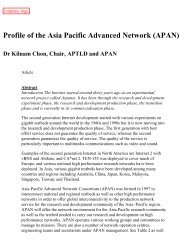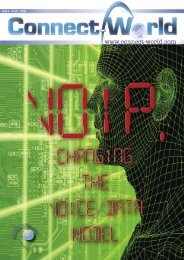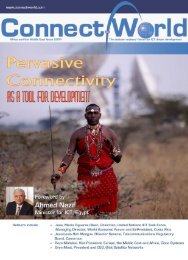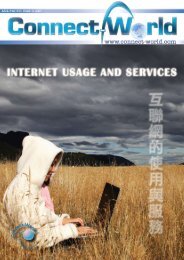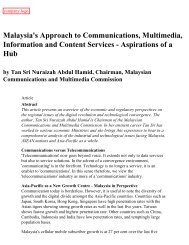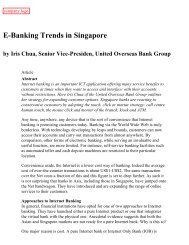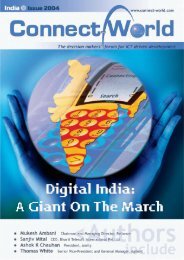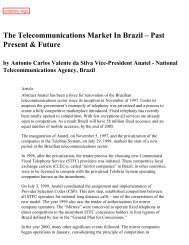Contents - Connect-World
Contents - Connect-World
Contents - Connect-World
You also want an ePaper? Increase the reach of your titles
YUMPU automatically turns print PDFs into web optimized ePapers that Google loves.
Global Development<br />
“Education will foster<br />
sustainable human<br />
development, reduce<br />
poverty and empower<br />
people to capitalise on<br />
their potential and<br />
skills. ”<br />
respective countrys economy. On the<br />
subject of education, it is important<br />
to promote learning as a basic human<br />
right, but due to socio-economic disparities<br />
between developed and<br />
developing countries, people in most<br />
developing countries do not even<br />
have access to education.<br />
In the context of ICT literacy, a concerted<br />
effort has to be made to integrate<br />
ICTs into educational programmes.<br />
This is needed to design<br />
and implement a well-defined infrastructure,<br />
which could also promote<br />
sustainable development.<br />
This issue was clearly stated in the<br />
Tokyo Declaration on the WSIS: The<br />
Asia-Pacific Perspective (2002) that<br />
ICTs can contribute to enhancing the<br />
quality of teaching and learning and<br />
sharing knowledge and information.<br />
It is hoped that through this process,<br />
the level of literacy and ICT skills will<br />
be greatly increased.<br />
Education will foster sustainable<br />
human development, reduce poverty<br />
and empower people to capitalise on<br />
their potential and skills.<br />
One other challenge that stands in<br />
the way of achieving these goals is,<br />
notably, the fact that developing<br />
countries have restricted access to<br />
technology owned by the developed<br />
countries. For example, advanced<br />
countries often use intellectual property<br />
rights to protect access to modern<br />
technology.<br />
Therefore, a more harmonious balance<br />
between protection and access<br />
“Investments in education<br />
and training, including<br />
basic and digital literacy,<br />
with consideration<br />
for culturally diverse<br />
digital content and<br />
material, are fundamental<br />
to the development<br />
of human capacity.”<br />
must be achieved. Likewise, we must<br />
underscore the importance of narrowing<br />
the gap between countries.<br />
This can best be accomplished by first<br />
allowing access to ICTs in developing<br />
countries and second making it<br />
affordable for them.<br />
<strong>Connect</strong>ivity is another vital element<br />
that must be considered if the implementation<br />
of ICTs is to give hope to<br />
anyone wishing to partake of the benefits<br />
of globalisation. In fact, connectivity<br />
is very central to enabling the<br />
construction of a foundation whereby<br />
everyone can participate and have<br />
equal access to technology.<br />
In this context, an example of what<br />
has been done to develop human<br />
capacity is the Government of<br />
Indonesias Information Technology<br />
Kiosk Programme, which was created<br />
to empower people by providing<br />
information on technologies useful to<br />
them.<br />
It can therefore be concluded that<br />
access to ICT education and training<br />
is critically important for the acceleration<br />
and expansion of a knowledgebased<br />
global society.<br />
For this reason, investments in education<br />
and training, including basic<br />
and digital literacy, with consideration<br />
for culturally diverse digital content<br />
and material, are fundamental to<br />
the development of human capacity.<br />
Hence, in order to take advantage of<br />
the potential benefits of information<br />
technology, these measures should be<br />
some of the core strategies adopted<br />
by each government and by other<br />
interested stakeholders.<br />
Moreover, it is important, through<br />
education, to develop human<br />
resources capable of responding to<br />
the demands of the modern information<br />
age and, similarly, able to<br />
address the rising demand for ICT<br />
professionals in various sectors.<br />
Increasing human capacity through<br />
ICT education and training will help<br />
countries meet the Millennium<br />
Development Goals (MDGs) and thus<br />
encourage the establishment of a<br />
knowledge-based global society. <br />
www.connect-world.com<br />
Visit<br />
the online version<br />
of the decision<br />
makers forum for<br />
ICT driven<br />
development.<br />
Review<br />
past issues, upcoming<br />
events and our<br />
contributing authors<br />
from around the<br />
globe.<br />
Sign up<br />
to receive<br />
<strong>Connect</strong>-<strong>World</strong><br />
Highlights,<br />
a fortnightly selection<br />
of provocative articles<br />
from some of the<br />
worlds top-level<br />
decision makers<br />
about how<br />
Information and<br />
Communications<br />
Technology<br />
is re-shaping the<br />
worlds economy,<br />
the societies<br />
we live in and the<br />
lives we lead.<br />
Visit<br />
<strong>Connect</strong>-<strong>World</strong> at:<br />
www.connect-world.com<br />
8



